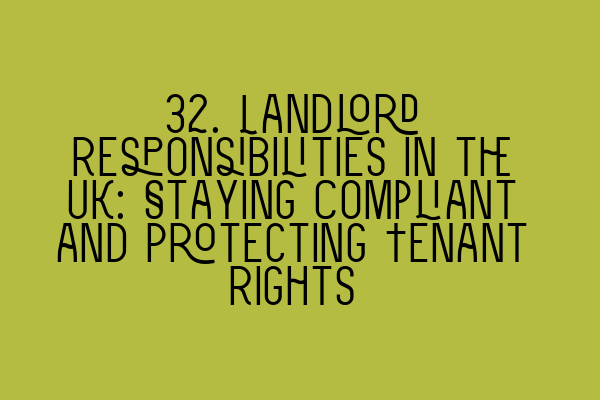Landlord Responsibilities in the UK: Staying Compliant and Protecting Tenant Rights
Being a landlord in the UK comes with a range of responsibilities. It is important to understand and fulfill these responsibilities to not only stay compliant with the law but also protect the rights of your tenants. In this article, we will outline the key landlord responsibilities in the UK and provide helpful tips to ensure you meet them.
1. Safety and Maintenance of the Property
As a landlord, you are responsible for ensuring that your property is safe and well-maintained. This includes conducting regular checks to identify any potential safety hazards and promptly addressing them. It is essential to comply with all relevant health and safety regulations, such as providing working smoke alarms, carbon monoxide detectors, and fire extinguishers.
SQE 1 Practice Exam Questions and SQE 1 Practice Mocks FLK1 FLK2 can help you test your knowledge about health and safety responsibilities as a landlord.
2. Tenancy Agreement
Creating a comprehensive tenancy agreement is crucial to protect both yourself and your tenants. The agreement should clearly outline the terms and conditions of the tenancy, including rent payment details, maintenance responsibilities, and rights and obligations of both parties. It is recommended to seek professional legal advice when drafting a tenancy agreement to ensure its compliance with the relevant laws and regulations.
If you need assistance with tenancy agreements and other legal aspects of being a landlord, SQE 2 Preparation Courses can provide you with the necessary knowledge and skills.
3. Deposit Protection
When renting out a property, you are legally required to protect your tenant’s deposit in a government-approved deposit protection scheme. This ensures that the deposit is safely held and can be returned to the tenant at the end of the tenancy, minus any allowable deductions. Failure to comply with deposit protection regulations can lead to severe penalties and legal disputes.
If you are unsure about the deposit protection process, it is advisable to consult SQE 1 Preparation Courses that cover landlord-tenant laws and requirements.
4. Repairs and Maintenance
As a landlord, you have a legal obligation to carry out repairs and maintenance to keep the property in a good state of repair. This includes addressing any structural or electrical issues, plumbing problems, or appliance malfunctions. Regular inspections should be conducted, and any necessary repairs should be undertaken promptly to ensure the safety and comfort of your tenants.
5. Right to Quiet Enjoyment
Tenants have the right to quiet enjoyment of the property during their tenancy. As a landlord, you must respect this right and refrain from unlawful eviction, harassment, or unnecessary intrusion into the tenant’s privacy. Before entering the property, you should provide sufficient notice in accordance with the law and only do so when necessary, such as for repairs or inspections.
6. Energy Performance Certificate (EPC)
Prior to renting out a property, you must obtain an Energy Performance Certificate (EPC). This certificate provides information on the energy efficiency of the property and must be given to prospective tenants. It is essential to ensure that the property meets the minimum energy efficiency standards set by the government. Failure to comply with EPC regulations can result in financial penalties.
If you want to stay up to date with SRA SQE Exam Dates and other essential information for landlords, SRA SQE Exam Dates can provide you with the necessary details.
Conclusion
Being a responsible landlord requires a thorough understanding of your legal obligations and a commitment to protecting your tenants’ rights. By fulfilling your responsibilities, you not only comply with the law but also contribute to a positive rental experience for your tenants. If you need further guidance on landlord responsibilities, it is advisable to consult with legal professionals experienced in property law and land law.
